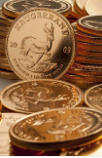Think and Decide Like a Poker Player
A memorable scene in John Wayne’s last film, “The Shootist” had the dying gunfighter, J.B. Books (Wayne), and the young Gillom Rogers (Ron Howard) talking, shooting and drinking.
John Bernard Books: [Interrupts] Bat Masterson?
Gillom Rogers: Yeah, he said that a man has to have guts, deliberation and a proficiency with firearms.
John Bernard Books: Did he mention that third eye you better have?
Gillom Rogers: Third eye?
John Bernard Books: For that dumbass amateur. There's always some six-fingered bustard that couldn't hit a cow in the tit with a tin cup. That's the one who usually does you in. But Masterson always was full of... sheep-dip.
So it sounds like Mr. Books the gunfighter was thinking the way poker players think: in bets. Former poker pro Annie Duke’s new book Thinking in Bets: Making Smarter Decisions When You Don't Have All the Facts, makes us think of our decision making not in a 50/50 way, or a zero percent--100 percent way, but account for those unknowns or as Books said, have “that third eye.”
Before being a poker pro from 1992 to 2012, Duke was working on a doctorate in cognitive psychology at Penn. She puts the chance of finishing that degree at 82 percent. Also, she was runner-up to Joan Rivers on Season 8 of the Celebrity Apprentice, fired by Donald Trump in the season finale.
Gunfights and life are like poker, not chess. Duke points out that chess isn’t really a game. There are no unknowns. Each player’s pieces are exposed to their opponent. There are right moves and wrong moves. Wrong moves generate losses. Correct moves generate wins.
On the other hand, there are unknowns in life and poker. You can play perfectly and lose, or stupidly and win. Too many people, including some poker players, Duke says, use results to determine if they made a good decision or a bad one. That’s a mistake she says. Luck may have determined your win and a continued repeat of that strategy or decision making will make you a loser in the long run.
At the same time a bit of bad luck can make a person too conservative in their future decision making.
She uses Pete Carroll’s game-ending decision in the 2015 Super Bowl to make her point. The Seahawks had the ball, second down, on New England’s one yard line with seconds left, down four points.
Everyone watching that game knew what Carroll’s play call would or should be: hand the ball to Marshawn Lynch. But, coach Carroll didn’t have Russell Wilson hand off, he had his quarterback throw. The pass was intercepted, the game was lost, and Carroll was criticized from coast to coast. What was he thinking?
Ms. Duke points out that Carroll was thinking in bets, rather than what most of us do. She estimates there was only a two percent chance a throw would be intercepted, while if the pass was incomplete, there was still time to run the Beast Mode. A completion would win the game. Throwing the pass was the best percentage play. However, Carroll was judged by the results.
He was unlucky. Gamblers would call it a “bad beat.” That two percent chance (six-fingered bastard) beat him and the Seahawks. The people who criticized Carroll were in engaging in hindsight bias, which Duke points out is, “an enemy of probabilistic thinking.” Hindsight bias in the words of Judge Frank Easterbrook, is “the human tendency to believe that whatever happened was bound to happen, and that everyone must have known it.”
My experience with government regulators is they engage in hindsight bias. For instance, bankers knew or should have known the real estate market would collapse in 2008.
Duke tells us to be outcome blind and focus on process. For instance, if you focus just on wins in say, investing, you’ll never let your winning stocks run up in price. You’ll sell too quickly, taking many small profits, which won’t overcome your loses.
“To some degree, we’re all outcome junkies,” she writes, “but the more we wean ourselves from that addiction, the happier we’ll be.” Bad things will happen to all of us, but at least we can make good bets. Focusing less on outcomes and more on our decision making process will allow us to learn from our mistakes.
While Ms. Duke doesn’t cite Hans Hoppe’s work on time preference, instead using the term ‘temporal discounting,’ she makes the point, “Our problem is that we’re ticker watchers of our own lives (focused on the short term).” We all should take the long view with respect to our happiness. “We would do well to view our happiness through a wide-angle lens, striving for a long, sustaining upward trend in our happiness stock.”
Investing pros will often remind us not to fall in love with the investments we hold. Duke says the same about our ideas. “In the long run, the more objective person will win against the more biased person.”
Poker players are a different breed, possessing the mathematical and psychological knowledge, in addition to the moxy, to bet a fortune on the turn of a card. Ms. Duke’s experience at the tables and insight will help you make better decisions and develop that “third eye.”







